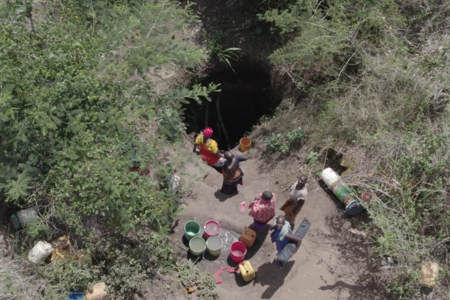Hoping for the best and letting water do the rest

Handeni District is one of the 11 districts in the Tanga Region in Tanzania. The District covers an area of 6,534 km2. For most people in Handeni, their primary source of income is through farming mainly maize and pastoralism. While the source of income exists, the head of clean and safe water in Handeni remains questionable as only 38% of residents in Handeni have access to water which is not necessarily clean and safe. Upon your visit to Handeni, you will find a lot of open local wells in most of the open spaces/areas while in town long queues of people waiting to fetch water in community taps with yellow water drums everywhere you turn. Usually, in Handeni, like most parts of Tanzania, the rainfall seasons are twice a year. However, for the past 5 years, the patterns have been different with cases of little or no rainfall at all or heavy rainfall.
Miriam Juma, a resident at Bangu ward, is a victim of water scarcity, where she walks for two hours to search for water every day so that she and her family could share the little water she manages to get. Where she fetches water used to be a dam before it was destroyed by heavy rainfalls and left the residents of Bangu ward without hope for water. Miriam gets water from a very deep hole where someone else in the hole gets her water to the surface for the price of 200/= tzs per 10 litres bucket. Miriam continues to stated that sometimes I have to leave my bucket in a queue for 3 days before I manage to get 20 litres of water because the demand is high and occasionally the water in the well runs dry. As if that is not enough, the water is not clean or safe, it usually has a thick white layer on top when left for a few hours which forces me to use the water right away even though I have waited for a few days, Mariam concludes as she prepares to go search for water.
Two years ago, heavy rainfall transpired in Handeni and damaged dams including the Kwamaizi, Bangu and kitulwe dams that were serving approximately 20,000 people in Handeni, thus, holding back access to clean and safe water by far. In that manner, WaterAid Tanzania through funds from Serengeti Breweries Limited which values sustainable development through social investment is planning to rehabilitate the mentioned 3 dams to reduce the implications caused by the deficiency of water in Handeni. On a broad expectation, once the construction/rehabilitation of the dams is finished, it will increase water access in Handeni by 4.6 per cent which will make a total of 42.6% coverage of water access in Handeni.
On the other hand, healthcare facilities in Handeni are struggling with unsafe water with Malaria, diarrhoea and UTI being the leading diseases in Handeni caused by shallow wells and dirty water. Healthcare facilities staff are struggling to clean and disinfect utensils in the facilities due to water salinity, which results on hospitals and dispensaries buying water, which is also expensive, said Dr. Feisal Said. Residents who live in Bangu, Kwamaizi and Kitulwe buy 1 water drum with 20 litters capacity for 1000/= tzs while the ones who live in town buy the same capacity for 1500/= tzs. The case is worse for schools, where they buy 3,000 litres of water for 120,000/= tzs and barely last for 3 days. This water usually has a high salt concentration, so students, patients, and residents buy bottled drinking water which adds economical challenges due to clean and safe water scarcity.
I am hoping for the best with this new upcoming project after it is completed, truly, access to clean and safe water that will be available all the time will be a huge step up for me, I will have time to engage in other economic activities and save the money that I am using right now to buy water to improve the welfare of my family. Miriam Added.
Thankfully to partners like Serengeti Breweries Tanzania Limited, the dreams of many women like Miriam will come true and the nightmare of long distances in searching for water will come to an end, patients in healthcare facilities will be well tended and girls will have proper menstrual hygiene in schools. As for WaterAid Tanzania, we aim to influence and work in partnership to achieve the goal. Lasting change in people’s habits and expectations and change in how countries and communities work.







